Legislative Changes: Evaluating 2015 Amendments to Probate Act (Vic)
VerifiedAdded on 2023/04/23
|8
|2407
|419
Essay
AI Summary
This essay critically evaluates the 2015 legislative amendments to Part IV of the Administration and Probate Act 1958 (Vic), focusing on the significant restrictions imposed on eligibility for Testator's Family Maintenance (TFM) claims. It examines how the amendments narrowed the categories of eligible claimants and altered the factors considered by the court when deciding the outcome of a TFM claim. The essay also discusses the implications of these changes, including their potential impact on the number of claims filed, the scrutiny applied to claims, and the relevance of interstate cases. While acknowledging that the amendments aim to reduce the number of applicants and suppress the amounts awarded, the essay concludes that the position of clear claims made by members of nuclear families has not changed significantly. It emphasizes the need for legal practitioners to establish their clients' eligibility under the new legislation and highlights the increased importance of factors such as dependency, conduct, and the testator's reasons for their will.
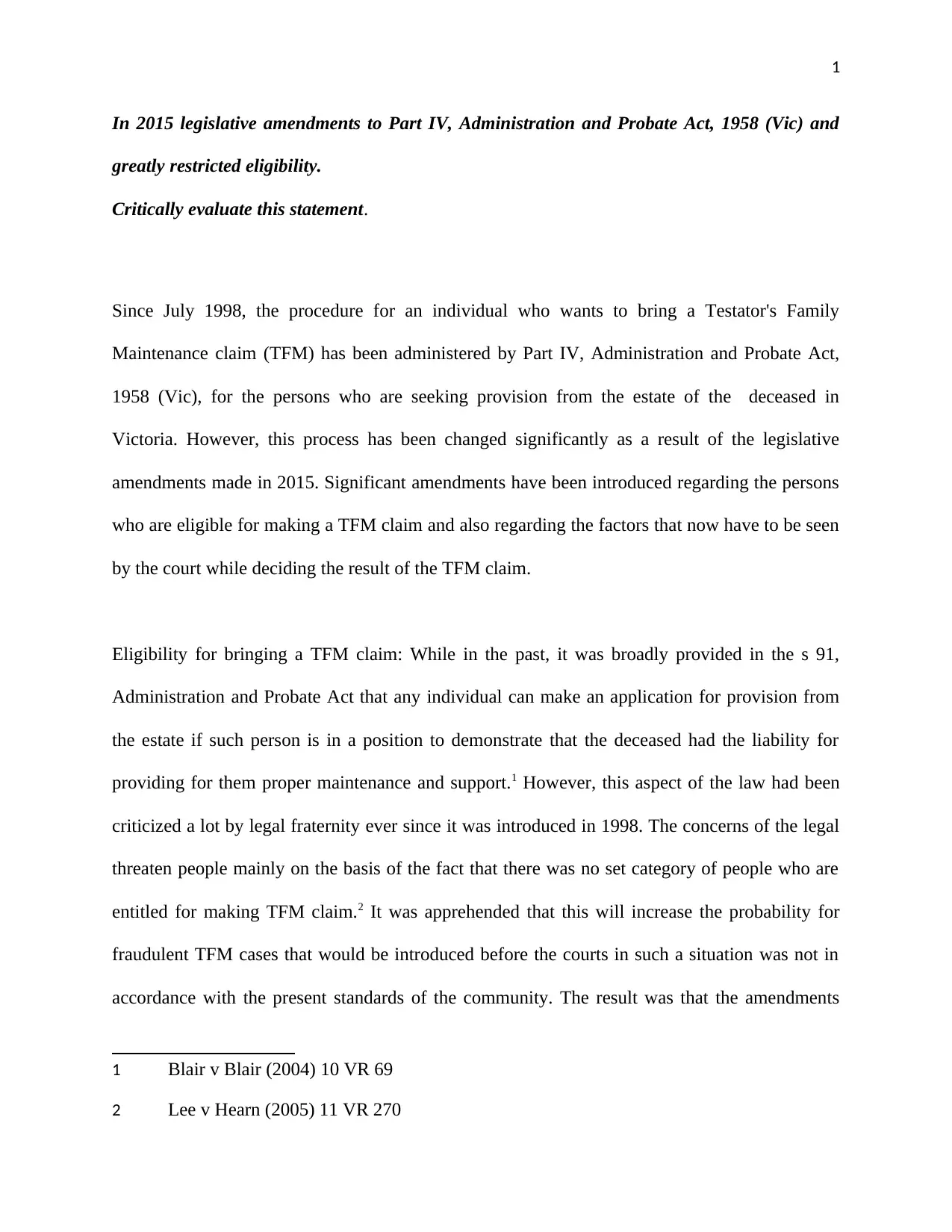
1
In 2015 legislative amendments to Part IV, Administration and Probate Act, 1958 (Vic) and
greatly restricted eligibility.
Critically evaluate this statement.
Since July 1998, the procedure for an individual who wants to bring a Testator's Family
Maintenance claim (TFM) has been administered by Part IV, Administration and Probate Act,
1958 (Vic), for the persons who are seeking provision from the estate of the deceased in
Victoria. However, this process has been changed significantly as a result of the legislative
amendments made in 2015. Significant amendments have been introduced regarding the persons
who are eligible for making a TFM claim and also regarding the factors that now have to be seen
by the court while deciding the result of the TFM claim.
Eligibility for bringing a TFM claim: While in the past, it was broadly provided in the s 91,
Administration and Probate Act that any individual can make an application for provision from
the estate if such person is in a position to demonstrate that the deceased had the liability for
providing for them proper maintenance and support.1 However, this aspect of the law had been
criticized a lot by legal fraternity ever since it was introduced in 1998. The concerns of the legal
threaten people mainly on the basis of the fact that there was no set category of people who are
entitled for making TFM claim.2 It was apprehended that this will increase the probability for
fraudulent TFM cases that would be introduced before the courts in such a situation was not in
accordance with the present standards of the community. The result was that the amendments
1 Blair v Blair (2004) 10 VR 69
2 Lee v Hearn (2005) 11 VR 270
In 2015 legislative amendments to Part IV, Administration and Probate Act, 1958 (Vic) and
greatly restricted eligibility.
Critically evaluate this statement.
Since July 1998, the procedure for an individual who wants to bring a Testator's Family
Maintenance claim (TFM) has been administered by Part IV, Administration and Probate Act,
1958 (Vic), for the persons who are seeking provision from the estate of the deceased in
Victoria. However, this process has been changed significantly as a result of the legislative
amendments made in 2015. Significant amendments have been introduced regarding the persons
who are eligible for making a TFM claim and also regarding the factors that now have to be seen
by the court while deciding the result of the TFM claim.
Eligibility for bringing a TFM claim: While in the past, it was broadly provided in the s 91,
Administration and Probate Act that any individual can make an application for provision from
the estate if such person is in a position to demonstrate that the deceased had the liability for
providing for them proper maintenance and support.1 However, this aspect of the law had been
criticized a lot by legal fraternity ever since it was introduced in 1998. The concerns of the legal
threaten people mainly on the basis of the fact that there was no set category of people who are
entitled for making TFM claim.2 It was apprehended that this will increase the probability for
fraudulent TFM cases that would be introduced before the courts in such a situation was not in
accordance with the present standards of the community. The result was that the amendments
1 Blair v Blair (2004) 10 VR 69
2 Lee v Hearn (2005) 11 VR 270
Paraphrase This Document
Need a fresh take? Get an instant paraphrase of this document with our AI Paraphraser
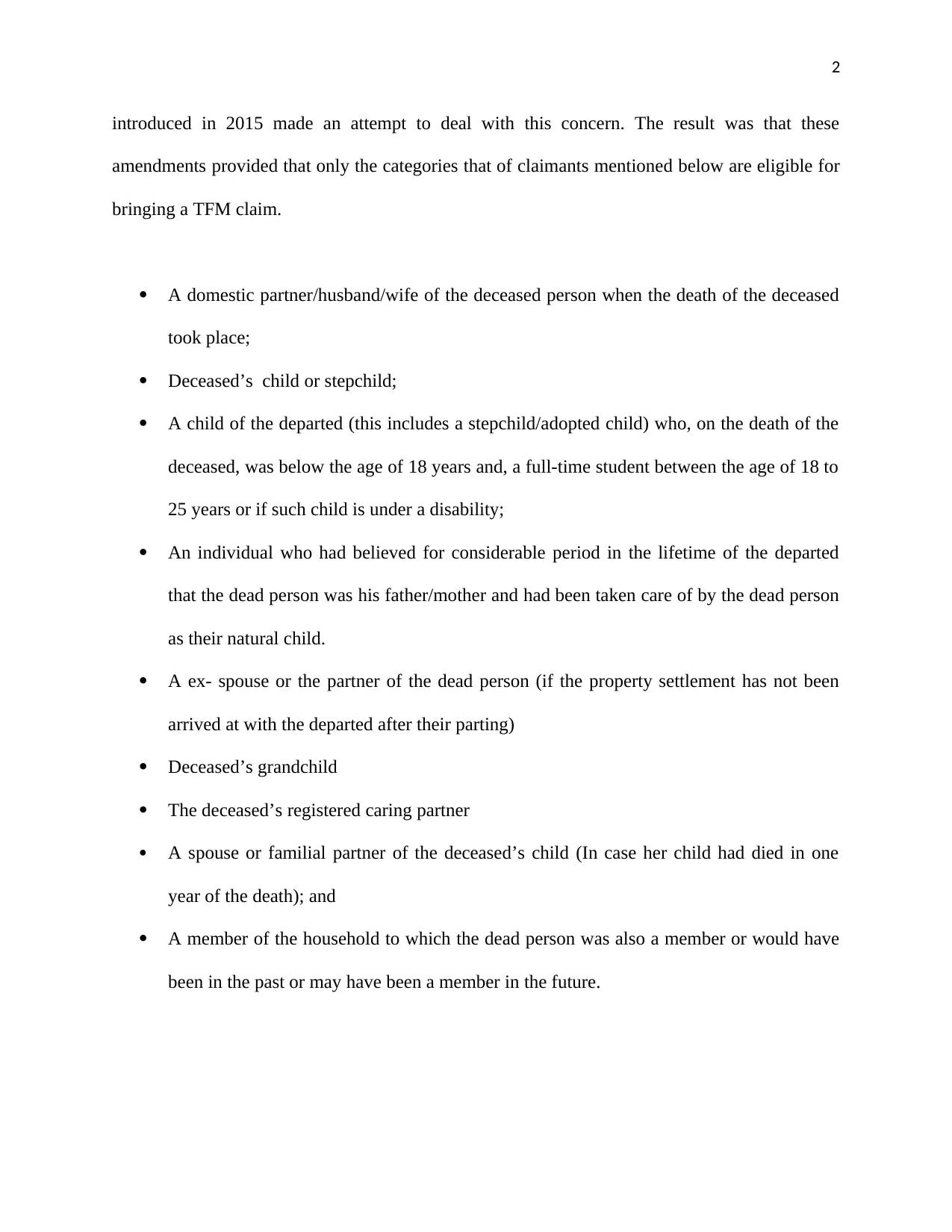
2
introduced in 2015 made an attempt to deal with this concern. The result was that these
amendments provided that only the categories that of claimants mentioned below are eligible for
bringing a TFM claim.
A domestic partner/husband/wife of the deceased person when the death of the deceased
took place;
Deceased’s child or stepchild;
A child of the departed (this includes a stepchild/adopted child) who, on the death of the
deceased, was below the age of 18 years and, a full-time student between the age of 18 to
25 years or if such child is under a disability;
An individual who had believed for considerable period in the lifetime of the departed
that the dead person was his father/mother and had been taken care of by the dead person
as their natural child.
A ex- spouse or the partner of the dead person (if the property settlement has not been
arrived at with the departed after their parting)
Deceased’s grandchild
The deceased’s registered caring partner
A spouse or familial partner of the deceased’s child (In case her child had died in one
year of the death); and
A member of the household to which the dead person was also a member or would have
been in the past or may have been a member in the future.
introduced in 2015 made an attempt to deal with this concern. The result was that these
amendments provided that only the categories that of claimants mentioned below are eligible for
bringing a TFM claim.
A domestic partner/husband/wife of the deceased person when the death of the deceased
took place;
Deceased’s child or stepchild;
A child of the departed (this includes a stepchild/adopted child) who, on the death of the
deceased, was below the age of 18 years and, a full-time student between the age of 18 to
25 years or if such child is under a disability;
An individual who had believed for considerable period in the lifetime of the departed
that the dead person was his father/mother and had been taken care of by the dead person
as their natural child.
A ex- spouse or the partner of the dead person (if the property settlement has not been
arrived at with the departed after their parting)
Deceased’s grandchild
The deceased’s registered caring partner
A spouse or familial partner of the deceased’s child (In case her child had died in one
year of the death); and
A member of the household to which the dead person was also a member or would have
been in the past or may have been a member in the future.
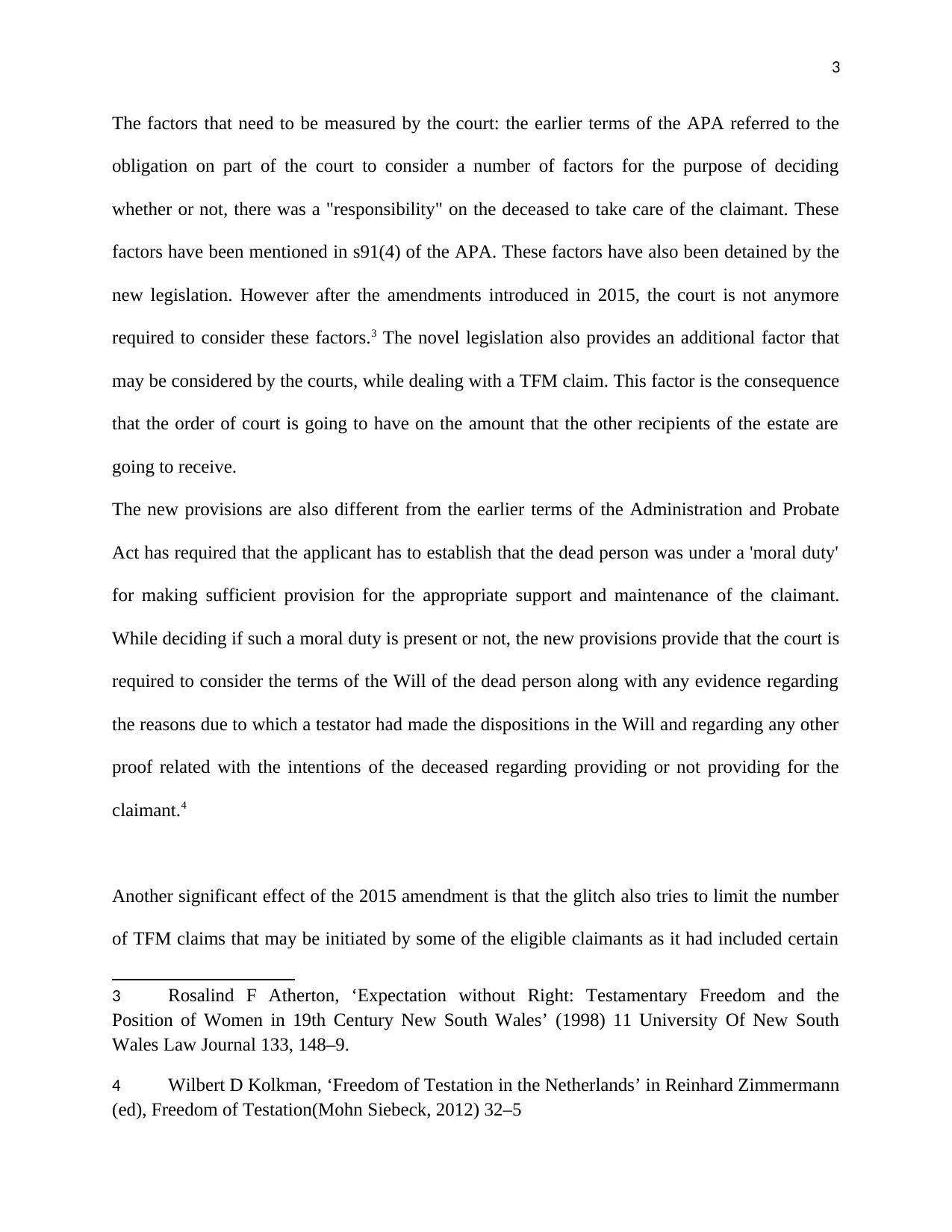
3
The factors that need to be measured by the court: the earlier terms of the APA referred to the
obligation on part of the court to consider a number of factors for the purpose of deciding
whether or not, there was a "responsibility" on the deceased to take care of the claimant. These
factors have been mentioned in s91(4) of the APA. These factors have also been detained by the
new legislation. However after the amendments introduced in 2015, the court is not anymore
required to consider these factors.3 The novel legislation also provides an additional factor that
may be considered by the courts, while dealing with a TFM claim. This factor is the consequence
that the order of court is going to have on the amount that the other recipients of the estate are
going to receive.
The new provisions are also different from the earlier terms of the Administration and Probate
Act has required that the applicant has to establish that the dead person was under a 'moral duty'
for making sufficient provision for the appropriate support and maintenance of the claimant.
While deciding if such a moral duty is present or not, the new provisions provide that the court is
required to consider the terms of the Will of the dead person along with any evidence regarding
the reasons due to which a testator had made the dispositions in the Will and regarding any other
proof related with the intentions of the deceased regarding providing or not providing for the
claimant.4
Another significant effect of the 2015 amendment is that the glitch also tries to limit the number
of TFM claims that may be initiated by some of the eligible claimants as it had included certain
3 Rosalind F Atherton, ‘Expectation without Right: Testamentary Freedom and the
Position of Women in 19th Century New South Wales’ (1998) 11 University Of New South
Wales Law Journal 133, 148–9.
4 Wilbert D Kolkman, ‘Freedom of Testation in the Netherlands’ in Reinhard Zimmermann
(ed), Freedom of Testation(Mohn Siebeck, 2012) 32–5
The factors that need to be measured by the court: the earlier terms of the APA referred to the
obligation on part of the court to consider a number of factors for the purpose of deciding
whether or not, there was a "responsibility" on the deceased to take care of the claimant. These
factors have been mentioned in s91(4) of the APA. These factors have also been detained by the
new legislation. However after the amendments introduced in 2015, the court is not anymore
required to consider these factors.3 The novel legislation also provides an additional factor that
may be considered by the courts, while dealing with a TFM claim. This factor is the consequence
that the order of court is going to have on the amount that the other recipients of the estate are
going to receive.
The new provisions are also different from the earlier terms of the Administration and Probate
Act has required that the applicant has to establish that the dead person was under a 'moral duty'
for making sufficient provision for the appropriate support and maintenance of the claimant.
While deciding if such a moral duty is present or not, the new provisions provide that the court is
required to consider the terms of the Will of the dead person along with any evidence regarding
the reasons due to which a testator had made the dispositions in the Will and regarding any other
proof related with the intentions of the deceased regarding providing or not providing for the
claimant.4
Another significant effect of the 2015 amendment is that the glitch also tries to limit the number
of TFM claims that may be initiated by some of the eligible claimants as it had included certain
3 Rosalind F Atherton, ‘Expectation without Right: Testamentary Freedom and the
Position of Women in 19th Century New South Wales’ (1998) 11 University Of New South
Wales Law Journal 133, 148–9.
4 Wilbert D Kolkman, ‘Freedom of Testation in the Netherlands’ in Reinhard Zimmermann
(ed), Freedom of Testation(Mohn Siebeck, 2012) 32–5
⊘ This is a preview!⊘
Do you want full access?
Subscribe today to unlock all pages.

Trusted by 1+ million students worldwide
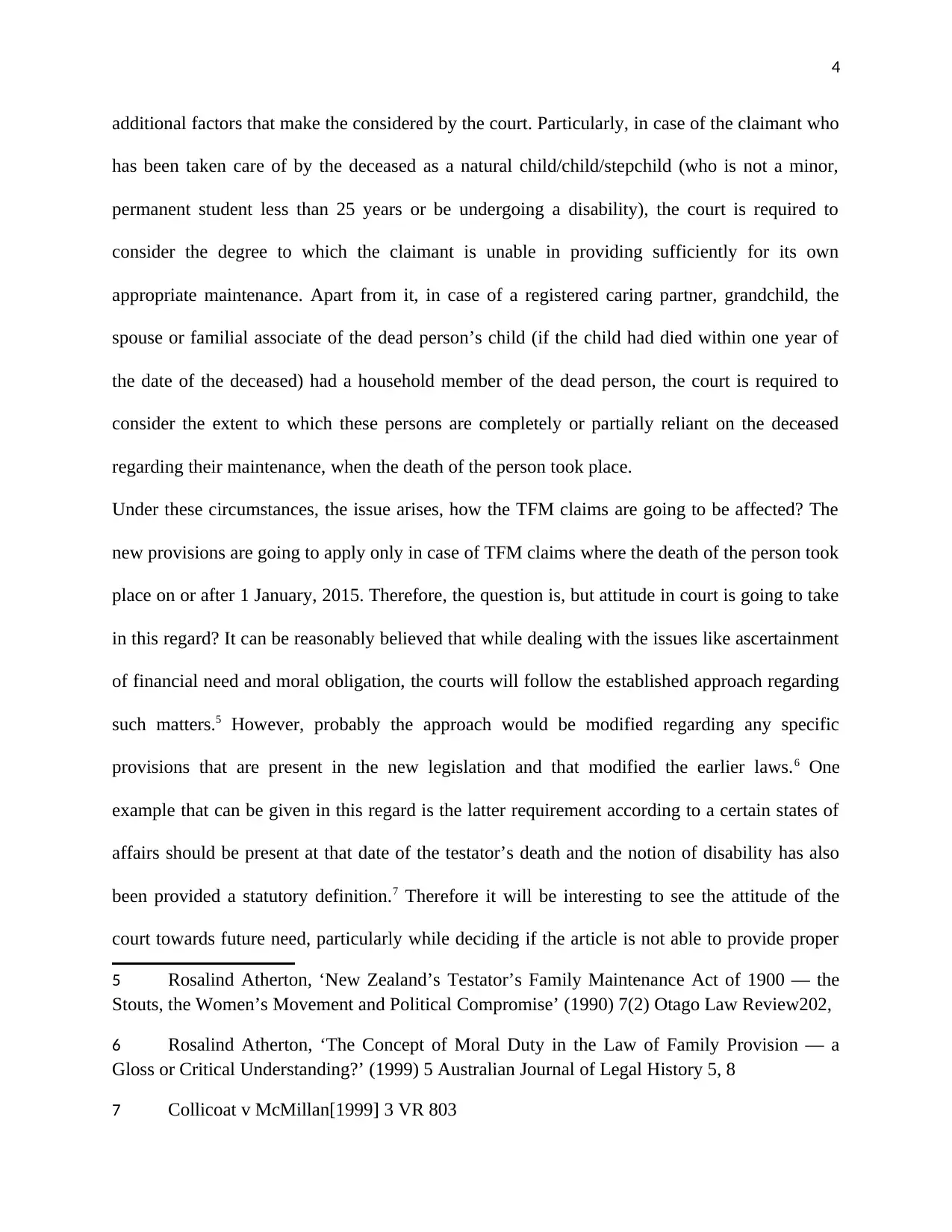
4
additional factors that make the considered by the court. Particularly, in case of the claimant who
has been taken care of by the deceased as a natural child/child/stepchild (who is not a minor,
permanent student less than 25 years or be undergoing a disability), the court is required to
consider the degree to which the claimant is unable in providing sufficiently for its own
appropriate maintenance. Apart from it, in case of a registered caring partner, grandchild, the
spouse or familial associate of the dead person’s child (if the child had died within one year of
the date of the deceased) had a household member of the dead person, the court is required to
consider the extent to which these persons are completely or partially reliant on the deceased
regarding their maintenance, when the death of the person took place.
Under these circumstances, the issue arises, how the TFM claims are going to be affected? The
new provisions are going to apply only in case of TFM claims where the death of the person took
place on or after 1 January, 2015. Therefore, the question is, but attitude in court is going to take
in this regard? It can be reasonably believed that while dealing with the issues like ascertainment
of financial need and moral obligation, the courts will follow the established approach regarding
such matters.5 However, probably the approach would be modified regarding any specific
provisions that are present in the new legislation and that modified the earlier laws.6 One
example that can be given in this regard is the latter requirement according to a certain states of
affairs should be present at that date of the testator’s death and the notion of disability has also
been provided a statutory definition.7 Therefore it will be interesting to see the attitude of the
court towards future need, particularly while deciding if the article is not able to provide proper
5 Rosalind Atherton, ‘New Zealand’s Testator’s Family Maintenance Act of 1900 — the
Stouts, the Women’s Movement and Political Compromise’ (1990) 7(2) Otago Law Review202,
6 Rosalind Atherton, ‘The Concept of Moral Duty in the Law of Family Provision — a
Gloss or Critical Understanding?’ (1999) 5 Australian Journal of Legal History 5, 8
7 Collicoat v McMillan[1999] 3 VR 803
additional factors that make the considered by the court. Particularly, in case of the claimant who
has been taken care of by the deceased as a natural child/child/stepchild (who is not a minor,
permanent student less than 25 years or be undergoing a disability), the court is required to
consider the degree to which the claimant is unable in providing sufficiently for its own
appropriate maintenance. Apart from it, in case of a registered caring partner, grandchild, the
spouse or familial associate of the dead person’s child (if the child had died within one year of
the date of the deceased) had a household member of the dead person, the court is required to
consider the extent to which these persons are completely or partially reliant on the deceased
regarding their maintenance, when the death of the person took place.
Under these circumstances, the issue arises, how the TFM claims are going to be affected? The
new provisions are going to apply only in case of TFM claims where the death of the person took
place on or after 1 January, 2015. Therefore, the question is, but attitude in court is going to take
in this regard? It can be reasonably believed that while dealing with the issues like ascertainment
of financial need and moral obligation, the courts will follow the established approach regarding
such matters.5 However, probably the approach would be modified regarding any specific
provisions that are present in the new legislation and that modified the earlier laws.6 One
example that can be given in this regard is the latter requirement according to a certain states of
affairs should be present at that date of the testator’s death and the notion of disability has also
been provided a statutory definition.7 Therefore it will be interesting to see the attitude of the
court towards future need, particularly while deciding if the article is not able to provide proper
5 Rosalind Atherton, ‘New Zealand’s Testator’s Family Maintenance Act of 1900 — the
Stouts, the Women’s Movement and Political Compromise’ (1990) 7(2) Otago Law Review202,
6 Rosalind Atherton, ‘The Concept of Moral Duty in the Law of Family Provision — a
Gloss or Critical Understanding?’ (1999) 5 Australian Journal of Legal History 5, 8
7 Collicoat v McMillan[1999] 3 VR 803
Paraphrase This Document
Need a fresh take? Get an instant paraphrase of this document with our AI Paraphraser
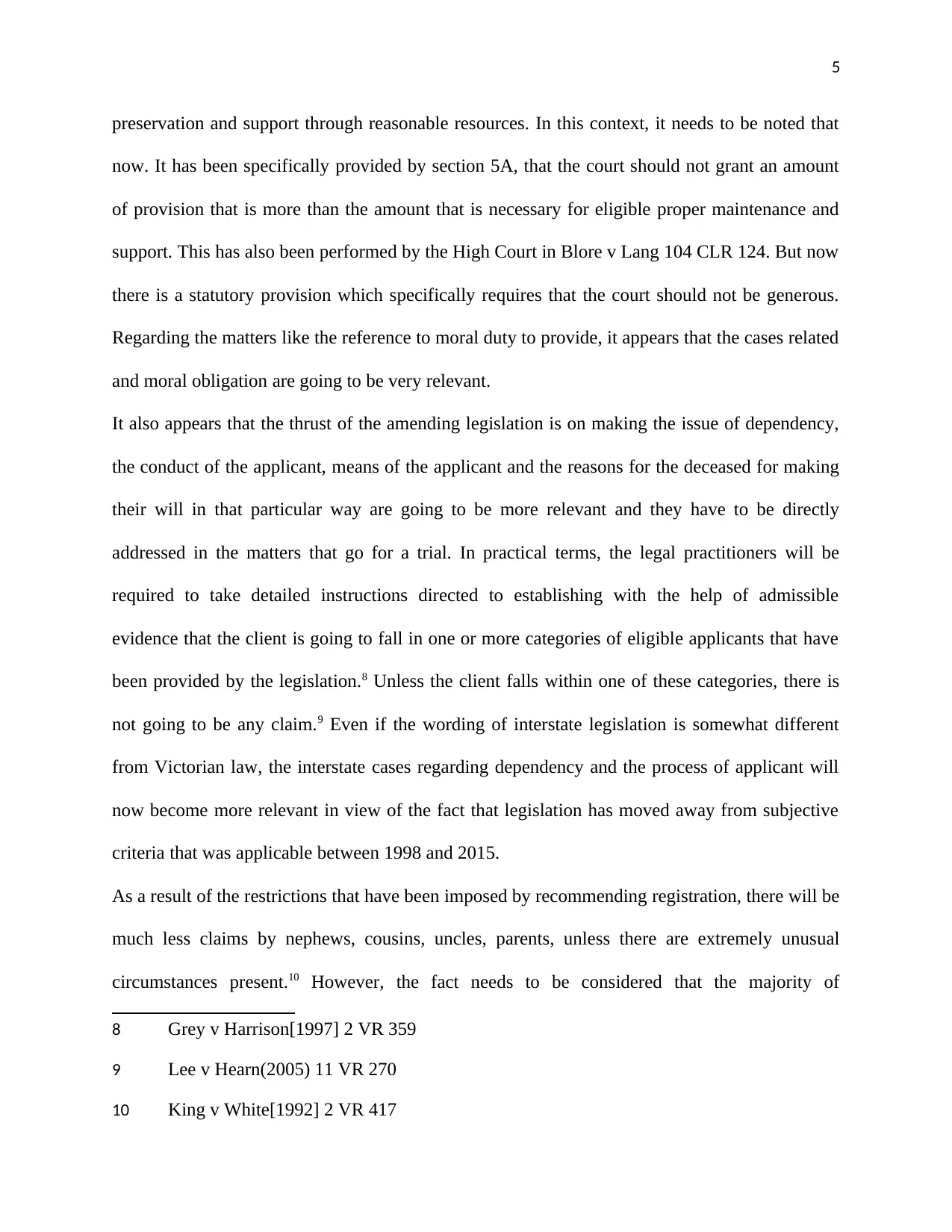
5
preservation and support through reasonable resources. In this context, it needs to be noted that
now. It has been specifically provided by section 5A, that the court should not grant an amount
of provision that is more than the amount that is necessary for eligible proper maintenance and
support. This has also been performed by the High Court in Blore v Lang 104 CLR 124. But now
there is a statutory provision which specifically requires that the court should not be generous.
Regarding the matters like the reference to moral duty to provide, it appears that the cases related
and moral obligation are going to be very relevant.
It also appears that the thrust of the amending legislation is on making the issue of dependency,
the conduct of the applicant, means of the applicant and the reasons for the deceased for making
their will in that particular way are going to be more relevant and they have to be directly
addressed in the matters that go for a trial. In practical terms, the legal practitioners will be
required to take detailed instructions directed to establishing with the help of admissible
evidence that the client is going to fall in one or more categories of eligible applicants that have
been provided by the legislation.8 Unless the client falls within one of these categories, there is
not going to be any claim.9 Even if the wording of interstate legislation is somewhat different
from Victorian law, the interstate cases regarding dependency and the process of applicant will
now become more relevant in view of the fact that legislation has moved away from subjective
criteria that was applicable between 1998 and 2015.
As a result of the restrictions that have been imposed by recommending registration, there will be
much less claims by nephews, cousins, uncles, parents, unless there are extremely unusual
circumstances present.10 However, the fact needs to be considered that the majority of
8 Grey v Harrison[1997] 2 VR 359
9 Lee v Hearn(2005) 11 VR 270
10 King v White[1992] 2 VR 417
preservation and support through reasonable resources. In this context, it needs to be noted that
now. It has been specifically provided by section 5A, that the court should not grant an amount
of provision that is more than the amount that is necessary for eligible proper maintenance and
support. This has also been performed by the High Court in Blore v Lang 104 CLR 124. But now
there is a statutory provision which specifically requires that the court should not be generous.
Regarding the matters like the reference to moral duty to provide, it appears that the cases related
and moral obligation are going to be very relevant.
It also appears that the thrust of the amending legislation is on making the issue of dependency,
the conduct of the applicant, means of the applicant and the reasons for the deceased for making
their will in that particular way are going to be more relevant and they have to be directly
addressed in the matters that go for a trial. In practical terms, the legal practitioners will be
required to take detailed instructions directed to establishing with the help of admissible
evidence that the client is going to fall in one or more categories of eligible applicants that have
been provided by the legislation.8 Unless the client falls within one of these categories, there is
not going to be any claim.9 Even if the wording of interstate legislation is somewhat different
from Victorian law, the interstate cases regarding dependency and the process of applicant will
now become more relevant in view of the fact that legislation has moved away from subjective
criteria that was applicable between 1998 and 2015.
As a result of the restrictions that have been imposed by recommending registration, there will be
much less claims by nephews, cousins, uncles, parents, unless there are extremely unusual
circumstances present.10 However, the fact needs to be considered that the majority of
8 Grey v Harrison[1997] 2 VR 359
9 Lee v Hearn(2005) 11 VR 270
10 King v White[1992] 2 VR 417
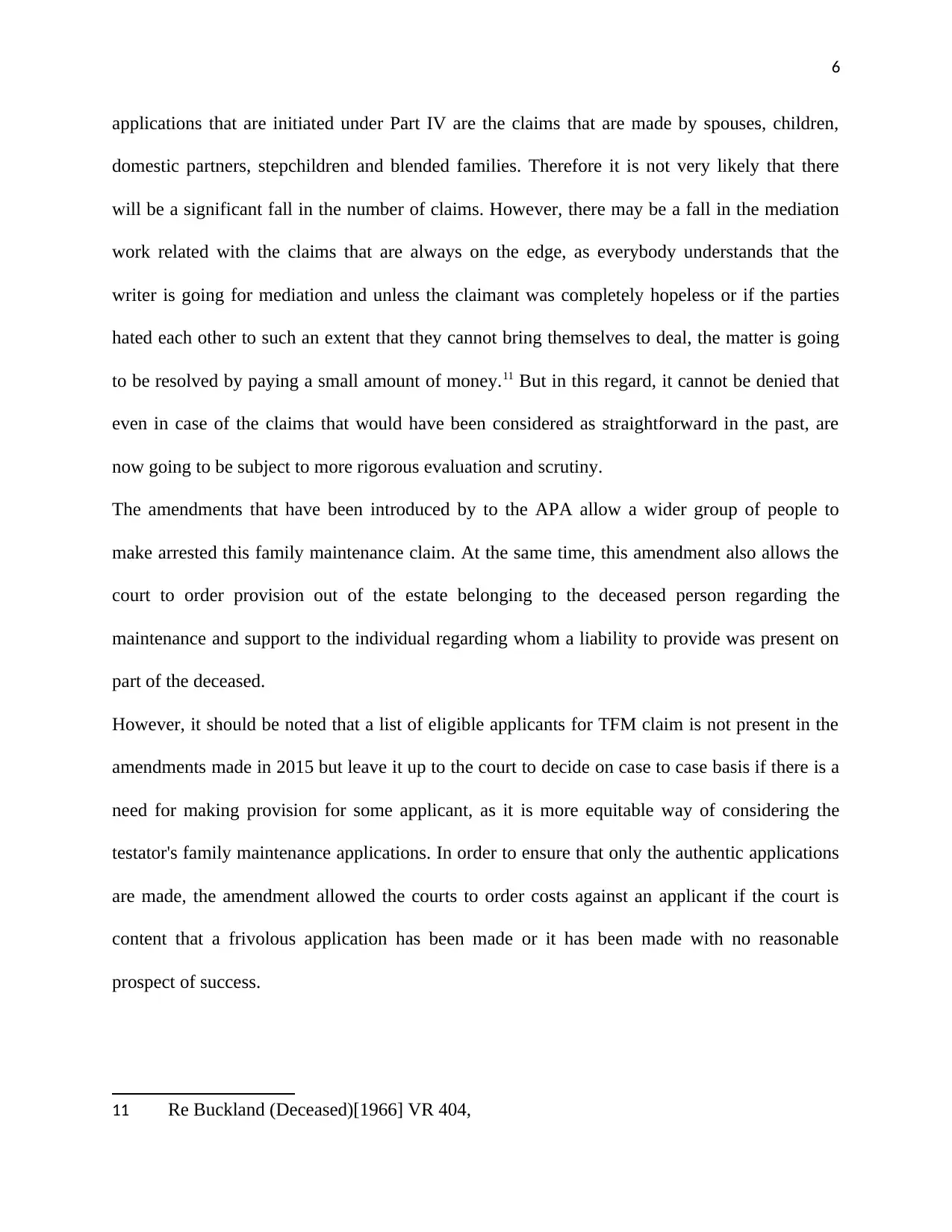
6
applications that are initiated under Part IV are the claims that are made by spouses, children,
domestic partners, stepchildren and blended families. Therefore it is not very likely that there
will be a significant fall in the number of claims. However, there may be a fall in the mediation
work related with the claims that are always on the edge, as everybody understands that the
writer is going for mediation and unless the claimant was completely hopeless or if the parties
hated each other to such an extent that they cannot bring themselves to deal, the matter is going
to be resolved by paying a small amount of money.11 But in this regard, it cannot be denied that
even in case of the claims that would have been considered as straightforward in the past, are
now going to be subject to more rigorous evaluation and scrutiny.
The amendments that have been introduced by to the APA allow a wider group of people to
make arrested this family maintenance claim. At the same time, this amendment also allows the
court to order provision out of the estate belonging to the deceased person regarding the
maintenance and support to the individual regarding whom a liability to provide was present on
part of the deceased.
However, it should be noted that a list of eligible applicants for TFM claim is not present in the
amendments made in 2015 but leave it up to the court to decide on case to case basis if there is a
need for making provision for some applicant, as it is more equitable way of considering the
testator's family maintenance applications. In order to ensure that only the authentic applications
are made, the amendment allowed the courts to order costs against an applicant if the court is
content that a frivolous application has been made or it has been made with no reasonable
prospect of success.
11 Re Buckland (Deceased)[1966] VR 404,
applications that are initiated under Part IV are the claims that are made by spouses, children,
domestic partners, stepchildren and blended families. Therefore it is not very likely that there
will be a significant fall in the number of claims. However, there may be a fall in the mediation
work related with the claims that are always on the edge, as everybody understands that the
writer is going for mediation and unless the claimant was completely hopeless or if the parties
hated each other to such an extent that they cannot bring themselves to deal, the matter is going
to be resolved by paying a small amount of money.11 But in this regard, it cannot be denied that
even in case of the claims that would have been considered as straightforward in the past, are
now going to be subject to more rigorous evaluation and scrutiny.
The amendments that have been introduced by to the APA allow a wider group of people to
make arrested this family maintenance claim. At the same time, this amendment also allows the
court to order provision out of the estate belonging to the deceased person regarding the
maintenance and support to the individual regarding whom a liability to provide was present on
part of the deceased.
However, it should be noted that a list of eligible applicants for TFM claim is not present in the
amendments made in 2015 but leave it up to the court to decide on case to case basis if there is a
need for making provision for some applicant, as it is more equitable way of considering the
testator's family maintenance applications. In order to ensure that only the authentic applications
are made, the amendment allowed the courts to order costs against an applicant if the court is
content that a frivolous application has been made or it has been made with no reasonable
prospect of success.
11 Re Buckland (Deceased)[1966] VR 404,
⊘ This is a preview!⊘
Do you want full access?
Subscribe today to unlock all pages.

Trusted by 1+ million students worldwide
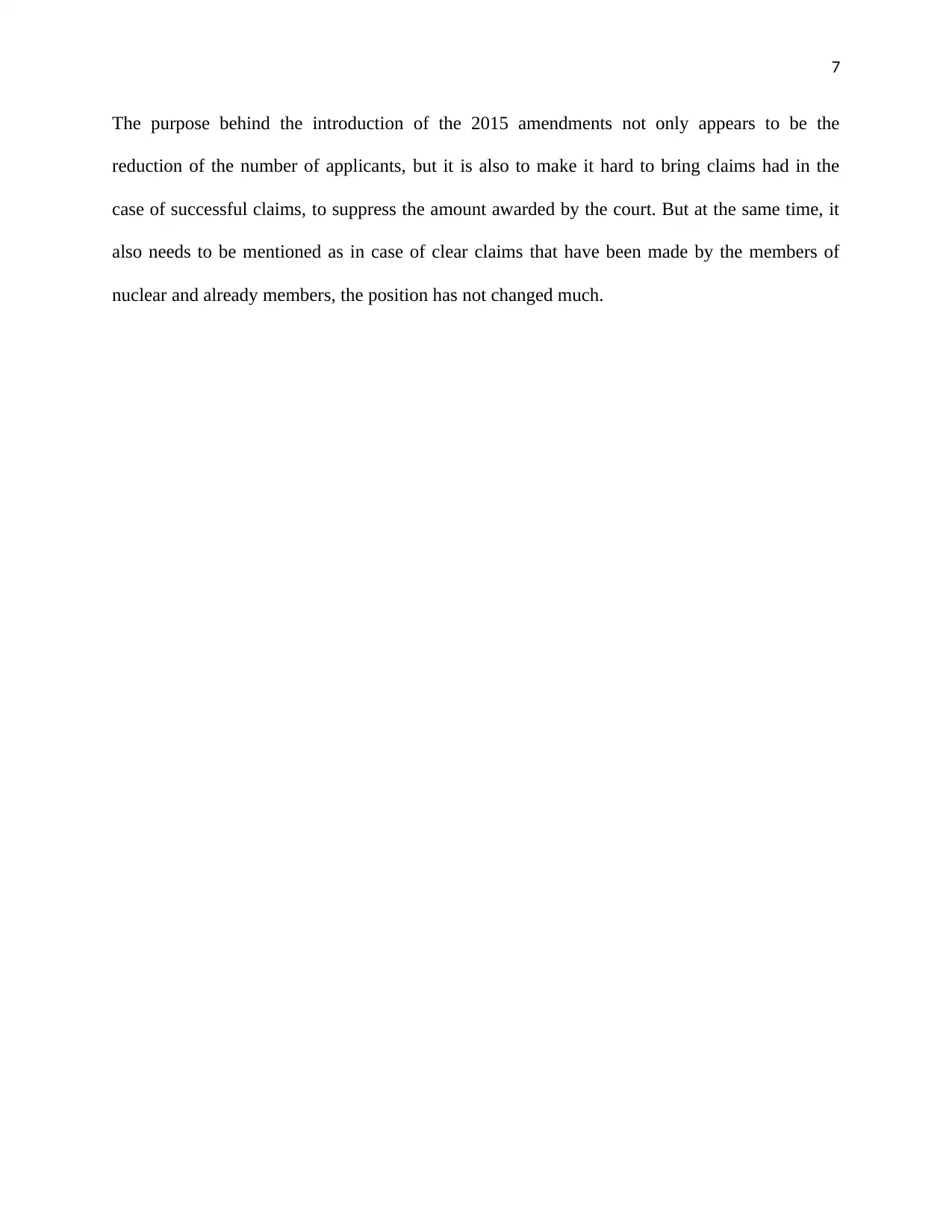
7
The purpose behind the introduction of the 2015 amendments not only appears to be the
reduction of the number of applicants, but it is also to make it hard to bring claims had in the
case of successful claims, to suppress the amount awarded by the court. But at the same time, it
also needs to be mentioned as in case of clear claims that have been made by the members of
nuclear and already members, the position has not changed much.
The purpose behind the introduction of the 2015 amendments not only appears to be the
reduction of the number of applicants, but it is also to make it hard to bring claims had in the
case of successful claims, to suppress the amount awarded by the court. But at the same time, it
also needs to be mentioned as in case of clear claims that have been made by the members of
nuclear and already members, the position has not changed much.
Paraphrase This Document
Need a fresh take? Get an instant paraphrase of this document with our AI Paraphraser
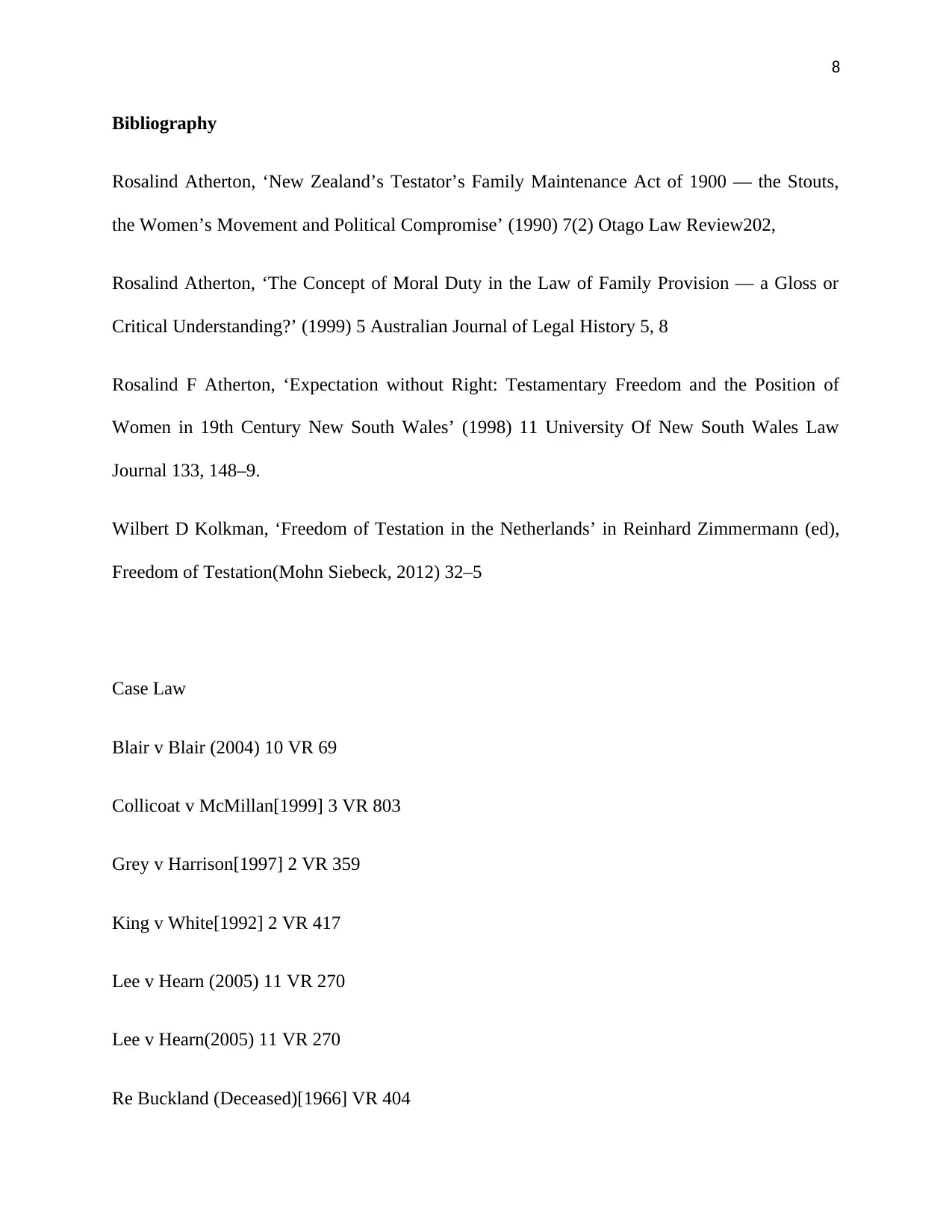
8
Bibliography
Rosalind Atherton, ‘New Zealand’s Testator’s Family Maintenance Act of 1900 — the Stouts,
the Women’s Movement and Political Compromise’ (1990) 7(2) Otago Law Review202,
Rosalind Atherton, ‘The Concept of Moral Duty in the Law of Family Provision — a Gloss or
Critical Understanding?’ (1999) 5 Australian Journal of Legal History 5, 8
Rosalind F Atherton, ‘Expectation without Right: Testamentary Freedom and the Position of
Women in 19th Century New South Wales’ (1998) 11 University Of New South Wales Law
Journal 133, 148–9.
Wilbert D Kolkman, ‘Freedom of Testation in the Netherlands’ in Reinhard Zimmermann (ed),
Freedom of Testation(Mohn Siebeck, 2012) 32–5
Case Law
Blair v Blair (2004) 10 VR 69
Collicoat v McMillan[1999] 3 VR 803
Grey v Harrison[1997] 2 VR 359
King v White[1992] 2 VR 417
Lee v Hearn (2005) 11 VR 270
Lee v Hearn(2005) 11 VR 270
Re Buckland (Deceased)[1966] VR 404
Bibliography
Rosalind Atherton, ‘New Zealand’s Testator’s Family Maintenance Act of 1900 — the Stouts,
the Women’s Movement and Political Compromise’ (1990) 7(2) Otago Law Review202,
Rosalind Atherton, ‘The Concept of Moral Duty in the Law of Family Provision — a Gloss or
Critical Understanding?’ (1999) 5 Australian Journal of Legal History 5, 8
Rosalind F Atherton, ‘Expectation without Right: Testamentary Freedom and the Position of
Women in 19th Century New South Wales’ (1998) 11 University Of New South Wales Law
Journal 133, 148–9.
Wilbert D Kolkman, ‘Freedom of Testation in the Netherlands’ in Reinhard Zimmermann (ed),
Freedom of Testation(Mohn Siebeck, 2012) 32–5
Case Law
Blair v Blair (2004) 10 VR 69
Collicoat v McMillan[1999] 3 VR 803
Grey v Harrison[1997] 2 VR 359
King v White[1992] 2 VR 417
Lee v Hearn (2005) 11 VR 270
Lee v Hearn(2005) 11 VR 270
Re Buckland (Deceased)[1966] VR 404
1 out of 8
Your All-in-One AI-Powered Toolkit for Academic Success.
+13062052269
info@desklib.com
Available 24*7 on WhatsApp / Email
![[object Object]](/_next/static/media/star-bottom.7253800d.svg)
Unlock your academic potential
Copyright © 2020–2026 A2Z Services. All Rights Reserved. Developed and managed by ZUCOL.


